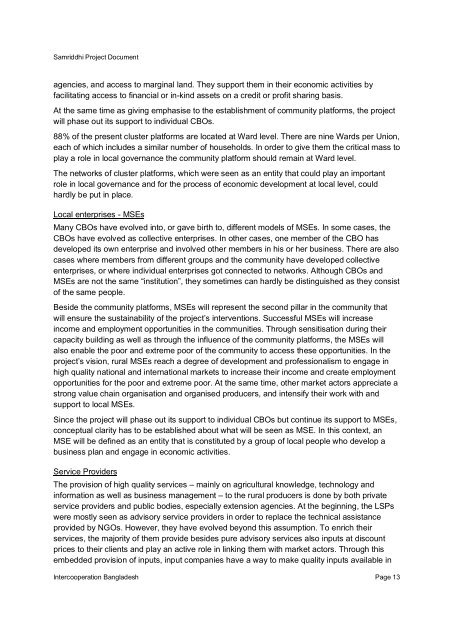Samriddhi
Samriddhi
Samriddhi
Create successful ePaper yourself
Turn your PDF publications into a flip-book with our unique Google optimized e-Paper software.
<strong>Samriddhi</strong> Project Document<br />
agencies, and access to marginal land. They support them in their economic activities by<br />
facilitating access to financial or in-kind assets on a credit or profit sharing basis.<br />
At the same time as giving emphasise to the establishment of community platforms, the project<br />
will phase out its support to individual CBOs.<br />
88% of the present cluster platforms are located at Ward level. There are nine Wards per Union,<br />
each of which includes a similar number of households. In order to give them the critical mass to<br />
play a role in local governance the community platform should remain at Ward level.<br />
The networks of cluster platforms, which were seen as an entity that could play an important<br />
role in local governance and for the process of economic development at local level, could<br />
hardly be put in place.<br />
Local enterprises - MSEs<br />
Many CBOs have evolved into, or gave birth to, different models of MSEs. In some cases, the<br />
CBOs have evolved as collective enterprises. In other cases, one member of the CBO has<br />
developed its own enterprise and involved other members in his or her business. There are also<br />
cases where members from different groups and the community have developed collective<br />
enterprises, or where individual enterprises got connected to networks. Although CBOs and<br />
MSEs are not the same “institution”, they sometimes can hardly be distinguished as they consist<br />
of the same people.<br />
Beside the community platforms, MSEs will represent the second pillar in the community that<br />
will ensure the sustainability of the project’s interventions. Successful MSEs will increase<br />
income and employment opportunities in the communities. Through sensitisation during their<br />
capacity building as well as through the influence of the community platforms, the MSEs will<br />
also enable the poor and extreme poor of the community to access these opportunities. In the<br />
project’s vision, rural MSEs reach a degree of development and professionalism to engage in<br />
high quality national and international markets to increase their income and create employment<br />
opportunities for the poor and extreme poor. At the same time, other market actors appreciate a<br />
strong value chain organisation and organised producers, and intensify their work with and<br />
support to local MSEs.<br />
Since the project will phase out its support to individual CBOs but continue its support to MSEs,<br />
conceptual clarity has to be established about what will be seen as MSE. In this context, an<br />
MSE will be defined as an entity that is constituted by a group of local people who develop a<br />
business plan and engage in economic activities.<br />
Service Providers<br />
The provision of high quality services – mainly on agricultural knowledge, technology and<br />
information as well as business management – to the rural producers is done by both private<br />
service providers and public bodies, especially extension agencies. At the beginning, the LSPs<br />
were mostly seen as advisory service providers in order to replace the technical assistance<br />
provided by NGOs. However, they have evolved beyond this assumption. To enrich their<br />
services, the majority of them provide besides pure advisory services also inputs at discount<br />
prices to their clients and play an active role in linking them with market actors. Through this<br />
embedded provision of inputs, input companies have a way to make quality inputs available in<br />
Intercooperation Bangladesh Page 13
















